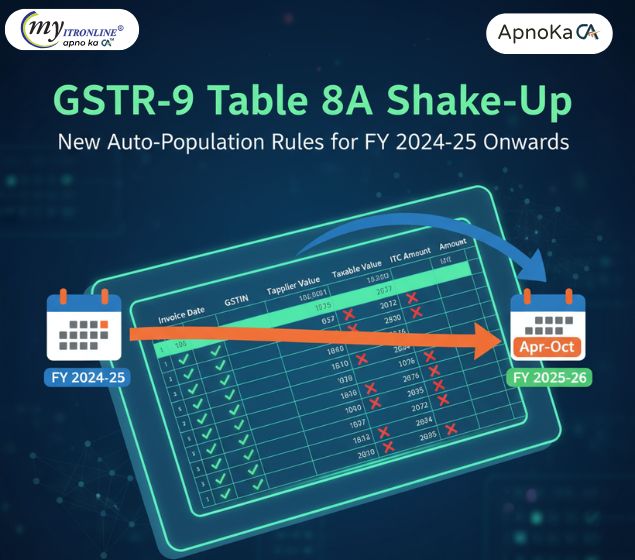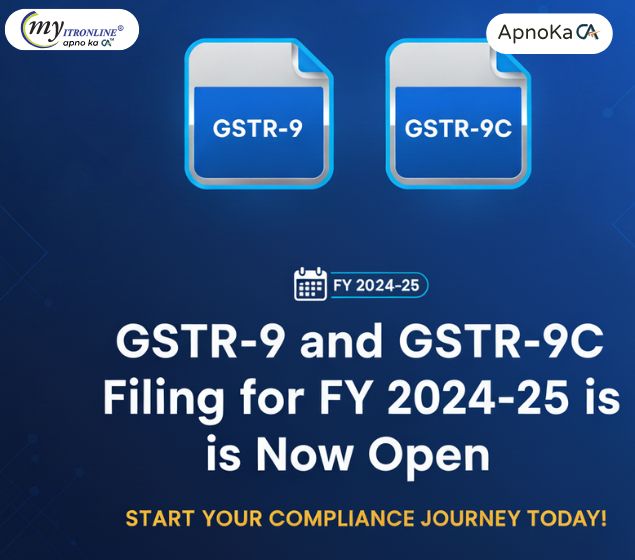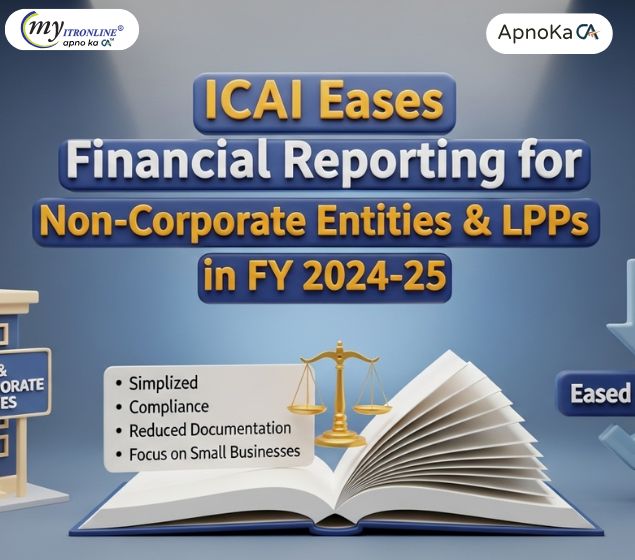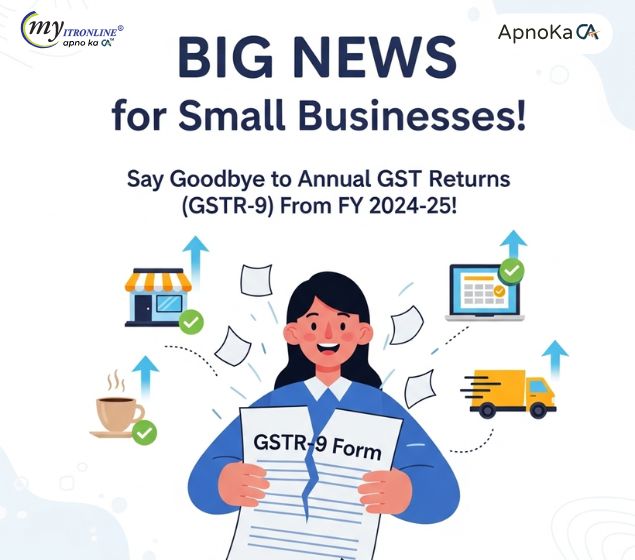# 2024
12 posts in `2024` tag

GSTR-9 Table 8A Shake-Up: New Auto-Population Rules for FY 2024-25
GSTN has changed how Table 8A in GSTR-9 is auto-filled. Starting FY 2024-25, it will include invoices from both the current and next financial year, making ITC reconciliation more accurate. Learn what’s included, what’s excluded, and how to prepare.

GSTR-9 and GSTR-9C Filing for FY 2024-25 is Now Open
The GST portal has enabled GSTR-9 and GSTR-9C forms for FY 2024-25 starting October 12, 2025. Taxpayers can now file their annual returns and reconciliation statements before the December 31 deadline. Learn who needs to file and how to prepare.

ICAI Eases Financial Reporting for Non-Corporate Entities & LLPs in FY 2024-25
The Institute of Chartered Accountants of India (ICAI) has announced a significant, temporary compliance relaxation for non-corporate entities and Limited Liability Partnerships (LLPs) for the Financial Year 2024-25. This allows these entities to optionally adopt updated guidance notes on financial statements, aiming to reduce administrative burden while maintaining transparency and accuracy. This flexibility ensures that core accounting standards remain paramount, offering businesses a choice in their reporting approach for the upcoming fiscal year.

Big News for Small Businesses: Say Goodbye to Annual GST Returns (GSTR-9) From FY 2024-25!
This blog post announces a significant and permanent change in GST compliance for small businesses in India. From Financial Year 2024-25, businesses with an annual aggregate turnover of up to 2 crore are exempt from filing the annual GST return (Form GSTR-9). The article details what changed, who benefits, and the tangible advantages like time and cost savings. It also highlights crucial reminders about continued monthly/quarterly filings, record-keeping, and turnover monitoring. The post emphasizes that this move will greatly enhance the "Ease of Doing Business" for millions of small enterprises.

Didn’t File ITR by September 16? Here’s What You Can Still Do
This blog post provides a comprehensive guide for individuals who have missed the September 16, 2025, deadline for filing their Income Tax Return (ITR) for FY 2024-25. It reassures readers that filing is still possible through a "belated return" by December 31, 2025, but outlines the associated penalties, including late filing fees (₹1,000 or ₹5,000) and interest on unpaid tax. The article also details other consequences of late filing, such as the inability to carry forward certain losses, delayed refunds, and potential loss of specific deductions. It touches on rare exceptions and what happens if even the belated deadline is missed. Finally, it offers practical advice to act promptly, gather documents, compute accurately, and seek professional help, promoting MyITROnline as a solution for simplified tax filing.
.jpg)
CBDT Instruction No. 01/2025 – Black Money Act Update for Minor Foreign Assets
The CBDT has issued Instruction No. 01/2025 on 18 August 2025, aligning its policy with the Finance (No. 2) Act, 2024. This update ensures that prosecution under Sections 49 and 50 of the Black Money Act will not be initiated for undisclosed non-immovable foreign assets valued up to ₹20 lakh. The move offers relief to genuine taxpayers, prevents harsh action for minor errors, and focuses enforcement on serious non-compliance cases.
.jpg)
4 Major Income Tax Changes for FY 2025-26 You Need to Know
This blog provides a detailed overview of four significant amendments to the Income Tax Act effective from Financial Year 2025-26. It covers the establishment of the new tax regime as the default option for taxpayers, the mandatory timely payments to MSMEs under the new Section 43B(h), the extension of tax benefits for startups, and the revised rules and thresholds for Tax Collected at Source (TCS) on foreign remittances and luxury goods.
.jpg)
Tax Audit under 44AB: Revised 2025 Essentials
This guide explains the updated Guidance Note on Tax Audit under Section 44AB of the Income-tax Act, 1961, for the Assessment Year 2025-26 (Financial Year 2024-25). It clarifies who needs a tax audit, points out key changes in Form 3CD, including new clauses for digital transactions, MSME reporting, and buybacks. It also outlines the audit process, lists important due dates, and details the penalties for non-compliance. The guide offers best practices for taxpayers to help ensure smooth audits and strong tax compliance in India.
.jpg)
Small Business & Professional Taxes: A Guide to Sections 44AA, 44AB, 44AD, 44ADA for FY 2024-25
For small businesses and professionals in India, understanding Sections 44AA, 44AB, 44AD, and 44ADA of the Income Tax Act, 1961, is essential for smooth tax compliance. This guide explains how these sections apply for the Financial Year 2024-25 (Assessment Year 2025-26). It covers necessary bookkeeping, tax audit rules, and the simplified presumptive taxation schemes that can greatly lessen the compliance burden for qualified taxpayers.
.jpg)
New Tax Audit Limits: Your Guide to AY 2025-26 Changes
This blog details the updated Tax Audit rules for AY 2025-26 (FY 2024-25), highlighting changes in turnover limits for businesses opting for presumptive taxation under Section 44AD and other key triggers for mandatory audits.
.jpg)
Your Wallet's Choice: 8 Reasons to Stick with the Old Tax Regime for FY 2024-25
This detailed blog post explores 8 compelling reasons why India's Old Tax Regime remains a more financially attractive option for many taxpayers in FY 2024-25. It breaks down crucial benefits like Section 80C investments, home loan interest, health insurance premiums, and other key deductions/exemptions, illustrating how these can lead to significant tax savings despite the New Tax Regime's lower rates
.jpg)
Understanding Agricultural Income Tax in India (FY 2024-25)
This blog post demystifies the tax treatment of agricultural income in India for the Financial Year 2024-25 onwards. It clearly defines what constitutes agricultural income and what does not. The post explains the crucial concept of "partial integration," a unique tax calculation method for individuals with both agricultural and non-agricultural income, illustrating it with a simple example. It also highlights essential compliance requirements like reporting agricultural income in ITR and maintaining records, alongside reasons for the historical tax exemption.
